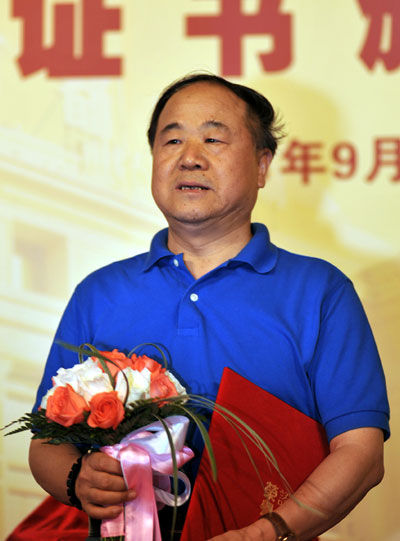莫言获诺贝尔文学奖 表现“非常平静”
 莫言获2012诺贝尔文学奖
莫言获2012诺贝尔文学奖The Nobel Prize in Literature for 2012 is awarded to the Chinese writer Mo Yan, "who with hallucinatory realism merges folk tales, history and the contemporary," announced Peter Englund, Permanent Secretary of the Swedish Academy in Stockholm on Thursday。
Mo Yan, 57, is one of the most celebrated Chinese writers, known for novels including Red Sorghum, the Garlic Ballads and Big Breasts & Wide Hips. "Mo Yan," meaning "don't speak" in Chinese, is a pen name. His real name is Guan Moye。
"I'm very happy to hear the news," Mo told China News Service after he was informed that he won the Nobel prize. "But I feel this award doesn't mean too much for me. There are many outstanding Chinese writers, whose excellent works could also be recognized by the world."
Next, Mo Yan added, he would still focus on writing his new book。
The awarding ceremony will be held on Dec. 10.
Last year's literature prize went to Swedish poet Tomas Transtromer。
Alfred Nobel, a Swedish industrialist who invented dynamite, established the Nobel Prizes in his will in 1895. The first awards were handed out six years later。
The winner will win a medal, a personal diploma and a cash award of 8 million Swedish Kronor (about 1 million U.S. dollars)。
Mo Yan, as a representative of Chinese authors, has based his works on his rich knowledge of the Chinese countryside where he grew up, and his insightful and critical thinking on Chinese history, society and personality, said Cheng Yongxin, who is also a friend of Mo。
At a bookshop reading in Beijing in January 2010, Mo told readers, "My characters are all very native Chinese, and my language is also imprinted with Chinese characteristics. I think that's why I've got international readership."
His literary achievements make him a serious competitor for this year’s prize. He has been a popular figure in China’s literary scene since the mid-1980s。
Most people would find it hard to associate the animalistic spirits in "Red Sorghum" with the mild-mannered and even timid looking Mo Yan。
Most of Mo Yan’s works are set in his own hometown, Gaomi County, in East China’s Shandong Province. Before the age of 20, he’d never ventured beyond the boundaries of his own county。
Mo Yan was born in 1955, the fourth child in his family. In his early years, he experienced poverty, hunger and was repressed by a particularly harsh father. All of these things have influenced Mo Yan’s later writings。
When Mo Yan was 12 years old, he was forced to leave school and graze cattle. To satisfy his thirst for reading, Mo Yan read every single book he could get hold of, even the dictionary。
When he turned 20, he joined the army and got to see the world beyond his home village. Six years later in 1981, he started his writing career. In 1987, "The Red Sorgum" burst onto China’s literary scene。
Red Sorghum was successfully filmed in 1987, directed by Zhang Yimou。
Mo Yan’s other major works include "The Republic of Wine", "Life and Death Are Wearing Me Out", "Sandalwood Death", "Big Breasts and Wide Hips" and more. Mo has won several top Chinese and international prizes including the Mao Dun Prize 2011 for "Frog"。
More than any other Chinese author, Mo Yan is well represented in foreign languages around the world. And with good reason - he’s one of the great novelistic masters of modern Chinese literature, with a long list of ambitious novels to his name. His writing is powerful, visual, and broad, dipping into history, fantasy and absurdity to tell stories of China and its people。
"Through a mixture of fantasy and reality, historical and social perspectives, Mo Yan has created a world reminiscent in its complexity of those in the writings of William Faulkner and Gabriel García Márquez, at the same time finding a departure point in old Chinese literature and in oral tradition," Nobel Prize website said, "In addition to his novels, Mo Yan has published many short stories and essays on various topics, and despite his social criticism is seen in his homeland as one of the foremost contemporary authors."
瑞典皇家科学院诺贝尔奖评审委员会11日宣布,中国作家莫言获得2012年诺贝尔文学奖。 委员会表示,莫言“将魔幻现实主义与民间故事、历史与当代社会融合在一起”。
莫言11日晚7时接受中新社记者电话采访时说,听到获奖的消息,我很高兴。但是我觉得获奖并不能代表什么,我认为中国有很多优秀的作家,他们的优秀作品也可以被世界所认可。
莫言说,接下来我还是会将大部分精力放在新作品的创作上。我会继续努力,感谢大家。至于是否前去瑞典领奖,我会等待诺贝尔奖组委会的通知和安排。
莫言研究会秘书长、莫言文学馆馆长毛维杰第一时间和莫言通了电话,据他转述,“我听到他的语气是非常平静的”。
莫言获诺贝尔文学奖 写作风格大胆 曾屡次获奖
自1980年代中期起,莫言以一系列乡土作品崛起,充满着“怀乡”以及“怨乡”的复杂情感。虽然早期被归类为“寻根文学”作家,但其写作风格素以大胆新奇著称,作品激情澎湃,想象诡异,语言肆虐。例如成名作《红高粱家族》里,不断出现的血腥场面中充满着强烈的感情控诉,在“屎尿横飞”的场景之间,是演义现代革命历史。
在经历《红高粱家族》的写作高峰后,莫言继续寻求突破,创作了大量中短篇作品及数部极具份量的长篇小说。其中,《丰乳肥臀》曾获中国有史以来最高额的“大家文学奖”,《檀香刑》曾获台湾《联合报》读书人年度文学类最佳书奖、第一届鼎钧双年文学奖,《红高粱系列》获第二届冯牧文学奖,《生死疲劳》获第二届红楼梦奖,《蛙》获第八届茅盾文学奖。
莫言摘2012诺贝尔文学奖 村上春树再次失之交臂
2012年诺贝尔文学奖于11日颁出。中国作家莫言被授予该奖,日本作家村上春树再次与诺奖失之交臂。此前村上春树得诺奖的呼声很高,甚至传出了正在准备新闻发布会的传闻,日媒也将文学奖视为囊中之物,认为必将归属村上春树。
多年来,村上春树一直被冠以“离诺贝尔文学奖最近的人”的称号。他曾多次处于各大博彩公司赔率表前三名,却至今未得奖。有评论称,得奖热门作家往往最终得不了奖评委会认为,既然这个作家已经被这么多人关注了,那就没必要再给一个文学奖了。中国诗人北岛也几乎每年出现在这个名单里。
新闻背景
近五年诺贝尔文学奖得主以及主要作品回顾
2011年,瑞典诗人托马斯·特兰斯特勒默获得了诺贝尔文学奖,授奖声明形容他的作品“简练、细腻,充满深刻的隐喻”。他自1958年起,他陆续发表《路上的秘密》《完成一半的天堂》《给生者与死者》以及《悲伤贡多拉》等诗集,逐渐在同代抒情诗人中奠定了领先地位。
2010年,秘鲁作家马里奥·巴尔加斯·略萨被授予诺贝尔文学奖,以表彰他为世界文学繁荣所作出的贡献。略萨第一部享誉世界的作品是他1963年出版的长篇小说《城市与狗》。其他比较著名的作品还包括《酒吧长谈》、《世界末日之战》、《公羊的节日》等。
2009年,德国女作家和诗人赫塔·米勒被授予诺贝尔文学奖,授奖词称,米勒的作品兼具诗歌的凝练和散文的率直,描写了一无所有、无所寄托者的境况。1982年其处女作、短篇小说集《低地》出版。其他作品有《河水奔流》、《行走界线》与《那时狐狸就是猎人》等。
2008年,法国作家勒·克莱齐奥被授予诺贝尔文学奖,授奖声明称,克莱齐奥将多元文化、人性和冒险精神融入创作,是一位善于创新、喜爱诗一般冒险和情感忘我的作家,在其作品里对游离于西方主流文明外和处于社会底层的人性进行了探索。克莱齐奥是20世纪后半期法国新寓言派代表作家之一,代表作有《诉讼笔录》、《寻金者》、《罗德里格岛游记》等。
2007年,英国女作家多丽丝·莱辛获得诺贝尔文学奖,1950年,她发表了第一部小说《青草在歌唱》。这部小说因深刻揭露了非洲殖民地的种族压迫和种族矛盾而引起强烈反响,莱辛由此在文坛崭露头角。其他作品包括《暴力的孩子们》、《金色笔记》、《黑暗前的夏天》、《第五个孩子》等。
- 晒奇葩:2012年十大搞笑诺贝尔奖出炉2012-09-24 15:11
- 中国“搞笑诺贝尔奖”出炉 数钱止疼上榜(图)2012-04-09 13:43
- 搞笑诺贝尔奖:让你HOLD不住的幽默2011-11-01 18:07
- 2011搞笑诺贝尔奖:谢耳朵式的奇思妙想2011-09-30 13:18


